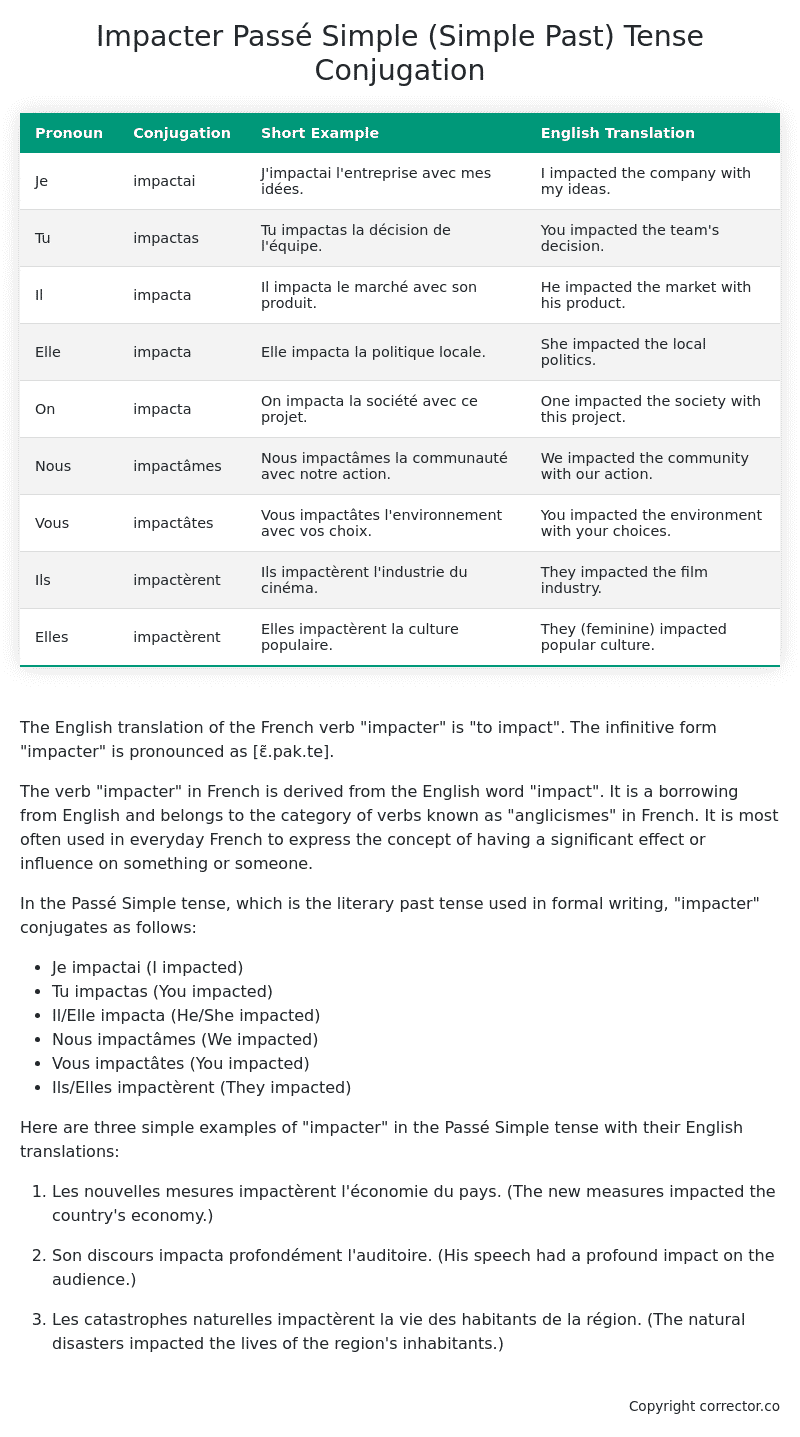Passé Simple (Simple Past) Tense Conjugation of the French Verb impacter
Introduction to the verb impacter
The English translation of the French verb “impacter” is “to impact”. The infinitive form “impacter” is pronounced as [ɛ̃.pak.te].
The verb “impacter” in French is derived from the English word “impact”. It is a borrowing from English and belongs to the category of verbs known as “anglicismes” in French. It is most often used in everyday French to express the concept of having a significant effect or influence on something or someone.
In the Passé Simple tense, which is the literary past tense used in formal writing, “impacter” conjugates as follows:
- Je impactai (I impacted)
- Tu impactas (You impacted)
- Il/Elle impacta (He/She impacted)
- Nous impactâmes (We impacted)
- Vous impactâtes (You impacted)
- Ils/Elles impactèrent (They impacted)
Here are three simple examples of “impacter” in the Passé Simple tense with their English translations:
-
Les nouvelles mesures impactèrent l’économie du pays. (The new measures impacted the country’s economy.)
-
Son discours impacta profondément l’auditoire. (His speech had a profound impact on the audience.)
-
Les catastrophes naturelles impactèrent la vie des habitants de la région. (The natural disasters impacted the lives of the region’s inhabitants.)
Table of the Passé Simple (Simple Past) Tense Conjugation of impacter
| Pronoun | Conjugation | Short Example | English Translation |
|---|---|---|---|
| Je | impactai | J’impactai l’entreprise avec mes idées. | I impacted the company with my ideas. |
| Tu | impactas | Tu impactas la décision de l’équipe. | You impacted the team’s decision. |
| Il | impacta | Il impacta le marché avec son produit. | He impacted the market with his product. |
| Elle | impacta | Elle impacta la politique locale. | She impacted the local politics. |
| On | impacta | On impacta la société avec ce projet. | One impacted the society with this project. |
| Nous | impactâmes | Nous impactâmes la communauté avec notre action. | We impacted the community with our action. |
| Vous | impactâtes | Vous impactâtes l’environnement avec vos choix. | You impacted the environment with your choices. |
| Ils | impactèrent | Ils impactèrent l’industrie du cinéma. | They impacted the film industry. |
| Elles | impactèrent | Elles impactèrent la culture populaire. | They (feminine) impacted popular culture. |
Other Conjugations for Impacter.
Le Present (Present Tense) Conjugation of the French Verb impacter
Imparfait (Imperfect) Tense Conjugation of the French Verb impacter
Passé Simple (Simple Past) Tense Conjugation of the French Verb impacter (You’re reading it right now!)
Passé Composé (Present Perfect) Tense Conjugation of the French Verb impacter
Futur Simple (Simple Future) Tense Conjugation of the French Verb impacter
Futur Proche (Near Future) Tense Conjugation of the French Verb impacter
Plus-que-parfait (Pluperfect) Tense Conjugation of the French Verb impacter
Passé Antérieur (Past Anterior) Tense Conjugation of the French Verb impacter
Futur Antérieur (Future Anterior) Tense Conjugation of the French Verb impacter
Subjonctif Présent (Subjunctive Present) Tense Conjugation of the French Verb impacter
Subjonctif Passé (Subjunctive Past) Tense Conjugation of the French Verb impacter
Subjonctif Imparfait (Subjunctive Imperfect) Tense Conjugation of the French Verb impacter
Subjonctif Plus-que-parfait (Subjunctive Pluperfect) Tense Conjugation of the French Verb impacter
Conditionnel Présent (Conditional Present) Tense Conjugation of the French Verb impacter
Conditionnel Passé (Conditional Past) Tense Conjugation of the French Verb impacter
Conditionnel Passé II (Conditional Past II) Tense Conjugation of the French Verb impacter
L’impératif Présent (Imperative Present) Tense Conjugation of the French Verb impacter
L’impératif Passé (Imperative Past) Tense Conjugation of the French Verb impacter
L’infinitif Présent (Infinitive Present) Tense Conjugation of the French Verb impacter
L’infinitif Passé (Infinitive Past) Tense Conjugation of the French Verb impacter
Le Participe Présent (Present Participle) Tense Conjugation of the French Verb impacter
Le Participe Passé (Past Participle) Tense Conjugation of the French Verb impacter
Struggling with French verbs or the language in general? Why not use our free French Grammar Checker – no registration required!
Get a FREE Download Study Sheet of this Conjugation 🔥
Simply right click the image below, click “save image” and get your free reference for the impacter Passé Simple tense conjugation!

Impacter – About the French Passé Simple (Simple Past) Tense
Formation
Usage
Narration
Historical Context
Interactions with other tenses
Passé Composé
Imparfait
Conditional and Subjunctive
Summary
I hope you enjoyed this article on the verb impacter. Still in a learning mood? Check out another TOTALLY random French verb conjugation!


